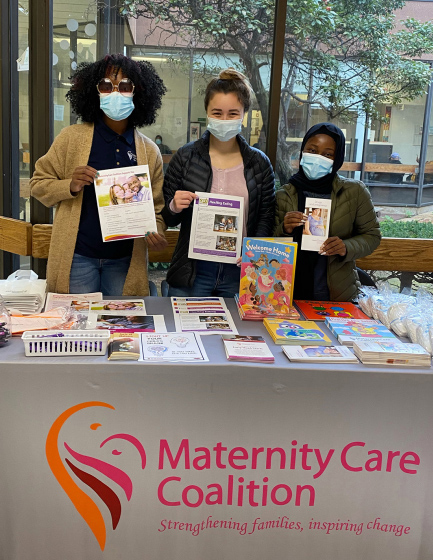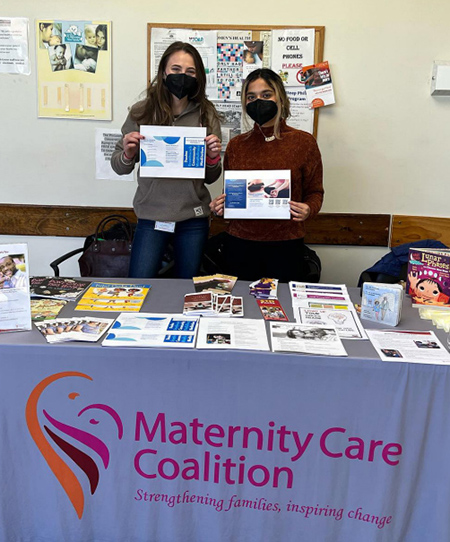The Mothers and Baby Dragons organization’s work may look different as a result of the COVID-19 pandemic, but the student-run group has stayed true to its original mission to help facilitate healthier pregnancies for parents from underserved communities. And in the 2022-2023 academic year, a partnership with the Maternity Care Coalition (MCC) is bringing Drexel medical students and expecting parents together in a whole new way.
Two to three times a month, medical student volunteers from Drexel University College of Medicine join MCC at community events or at a City of Philadelphia health center to assist in sharing health information and resources with pregnant people and their families.
“We met with MCC at the beginning of this year, and their big need was in patient education,” says Emma Beale, MD ’25, a Mothers and Baby Dragons steering coordinator. “Patient education is obviously a very big component of being a physician, and learning how to do that while we’re providing a service to the community is a really cool opportunity.”

Second-year MD students Emma Beale (center) and Maryam Durosinmi (right), who both serve as Mothers and Baby Dragons coordinators, staffing an information table at Philadelphia’s Health Center 5 with Kayesha Willis from MCC.
MCC has been active in Philadelphia since 1980, with various programs aimed at improving health and wellness for families facing health disparities, financial need and other inequities. This fall, they provided Mothers and Baby Dragons medical student volunteers with a list of topics, from mindfulness during pregnancy to postpartum mental health, to share with community members through fliers, brochures and conversations.
Mothers and Baby Dragons, as created by Allison Gutierrez, MD ’18, paired medical students with expecting parents to act as health navigators during pregnancy. The medical students attended patients’ prenatal appointments and provided emotional support, health guidance, postpartum support and more.
That work was put on pause due to safety concerns amid the COVID-19 pandemic, and last year, Mothers and Baby Dragons’ student leaders began planning for a new partnership with MCC.
Beale and a classmate staffed an information table at the City of Philadelphia’s Health Center 5 with MCC at the beginning of fall 2022, using MCC’s own educational materials to talk with pregnant people about nutrition during pregnancy. They also helped share information on other local resources with expecting parents in need.
“I think it was really neat to be able to talk with different pregnant individuals and share information that’s so easy to spread, but that people don’t necessarily hear if they don’t have a primary care physician, or if they’ve never been pregnant before,” Beale says.

First-year MD students Jennie Reisman and Ifrah Malik volunteering at an information table at Philadelphia’s Health Center 5.
Maryam Durosinmi, MD ’25, an events and advocacy coordinator for Mothers and Baby Dragons, says these outreach opportunities help medical students gain real-world experience with the values and skills around patient communication that they have learned in the classroom. While working with MCC, students meet patients from different races and ethnic backgrounds, with various ages, levels of education, levels of parenting experience and the like.
“We get experience in meeting patients where they are, in the sense that everyone comes with different levels of understanding, and needs,” Durosinmi says. “And meeting people where they are is something we’re learning in our Foundations of Patient Care curriculum.”
Beale agrees, adding that in the field, medical students are not only practicing patient education, but they are also working on determining how well they have communicated information. For instance, Beale says, the medical students might have patients repeat the information they have learned to determine whether everything has been communicated effectively.
Simone Udeh, MD ’25, a Mothers and Baby Dragons steering coordinator, says creating educational materials for expecting parents helps medical students develop a deeper understanding of prenatal care topics ahead of their clinical training. Thanks to her time with Mothers and Baby Dragons, Udeh is prepared if a future patient asks whether it is safe to exercise during pregnancy or needs help finding community resources.
“If a patient says to me, ‘I can’t afford this, but it would be really nice to have a doula,’ I know MCC has doulas, and I could recommend them to my patient,” Udeh says. “Of course, passing on clinical information to your patients is really helpful, but it’s also about the little things that make their pregnancies less complicated and stressful.”
Some resources to which a physician could direct a patient in need have more complex eligibility requirements than others, says Emily Kou, MD ’25, a Mothers and Baby Dragons events coordinator. “For instance, MCC facilitates helping pregnant people get free car seats, but in order to qualify for that, you need to already be approved to receive certain government assistance,” Kou says. “That really goes to show that there are a lot of moving parts, and a physician who has exposure to that can really benefit patients.”
The student leaders say they were grateful not only for what they have been learning through their work alongside MCC, but also for the opportunity to make a difference in the lives of pregnant people facing health inequities and barriers to care.
The focus on patient outreach initially brought Udeh to Mothers and Baby Dragons. She says patients may not know about all the resources available to them to help as they grow their families, or know how to access every program, but MCC and Mothers and Baby Dragons can help them find what they need.
“I wanted to spread the word on these resources that are accessible now but haven’t historically been accessible to underserved communities,” Udeh says. “A lot of this boils down to lack of access: lack of clinical access, lack of access to resources. Each of us is just doing our part to bridge that gap, which is something that I definitely want to be part of.”
To learn more about Mothers and Baby Dragons, follow the group on Instagram at ducom_mbd.